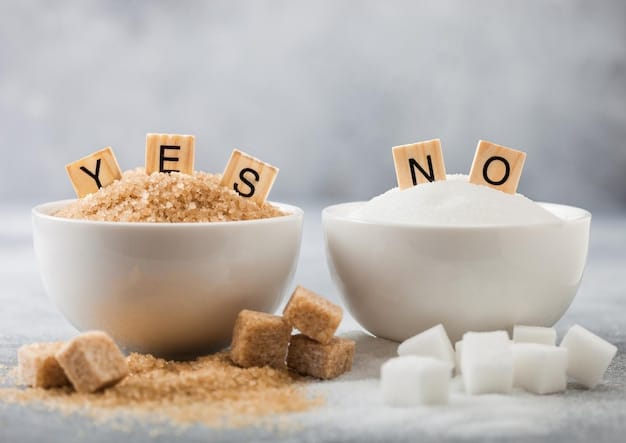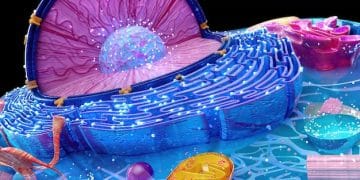The Truth About Artificial Sweeteners: Are They Really Safe? Unveiling the Facts

The Truth About Artificial Sweeteners: Are They Really Safe? This article cuts through the confusion, providing a balanced look at artificial sweeteners, their potential health impacts, and scientific evidence to help you make informed choices.
Are you wondering about the truth about artificial sweeteners: Are they really safe? It’s a question many health-conscious individuals ponder as they navigate the world of low-calorie and sugar-free foods. Let’s delve into the scientific evidence and separate fact from fiction.
This article aims to provide a clear and balanced view, helping you understand the potential risks and benefits of these widely used sugar substitutes and whether the truth about artificial sweeteners: Are they really safe?
Understanding Artificial Sweeteners: What Are They?
Artificial sweeteners are synthetic or processed sugar substitutes that provide a sweet taste without the calories of sugar. They’re found in many foods and beverages marketed as “diet” or “sugar-free.” But what exactly are they made of, and how do they work?
Common Types of Artificial Sweeteners
Several artificial sweeteners are approved for use in the US. Here’s a brief overview of some of the most common ones:
- Aspartame: Known by brand names like NutraSweet and Equal, it’s about 200 times sweeter than sugar.
- Sucralose: Marketed as Splenda, it is made from sugar but is not metabolized by the body, making it calorie-free.
- Saccharin: One of the oldest artificial sweeteners, it is sold as Sweet’N Low and is about 300 times sweeter than sugar.
- Stevia: Often marketed as a “natural” sweetener, it is derived from the stevia plant.
These sweeteners work by activating the sweet taste receptors on the tongue, similar to how sugar does, but without contributing significantly to calorie intake. The truth about artificial sweeteners: Are they really safe? lies in understanding how each of these affects the body individually.

The Safety Debate: Are Artificial Sweeteners Harmful?
The safety of artificial sweeteners has been a topic of debate for decades. Early studies raised concerns about potential health risks, but subsequent research has largely refuted these claims. So, where does the truth lie? The truth about artificial sweeteners: Are they really safe? requires a careful examination of the scientific evidence.
Regulatory Approval and Research
Regulatory agencies like the FDA (U.S. Food and Drug Administration) have approved several artificial sweeteners for use in foods and beverages. These approvals are based on extensive scientific reviews. However, some studies continue to raise questions.
- Cancer Concerns: Early studies linking saccharin to bladder cancer in rats led to warning labels. However, later research showed these effects were not relevant to humans.
- Gut Health: Some research suggests that artificial sweeteners may affect gut bacteria, potentially leading to metabolic issues.
- Weight Management: While intended to aid weight loss, some studies indicate that artificial sweeteners might increase cravings for sweet foods.
The overall consensus is that artificial sweeteners are safe when consumed within the Acceptable Daily Intake (ADI) levels set by regulatory bodies. However, individual responses can vary, and ongoing research is crucial. Considering the truth about artificial sweeteners: Are they really safe?, it’s important to stay informed and mindful of personal reactions.
Artificial Sweeteners and Weight Management
One of the primary reasons people use artificial sweeteners is to manage their weight. By replacing sugar with calorie-free alternatives, individuals hope to reduce their calorie intake and shed pounds. But do artificial sweeteners really help with weight management?
While artificial sweeteners can reduce calorie intake, their impact on weight management is complex. Some studies show that they can be effective in the short term, helping people reduce their overall calorie consumption. However, other research suggests that they may interfere with the body’s natural ability to regulate appetite and energy intake.
For example, some studies have found that artificial sweeteners may disrupt the gut microbiome, leading to changes in metabolism and an increased risk of weight gain. Additionally, the intense sweetness of these substitutes might lead to a preference for sweet foods, making it harder to maintain a healthy diet in the long run. Exploring the truth about artificial sweeteners: Are they really safe? also means considering their effects on eating behaviors.
Potential Side Effects and Health Implications
While approved artificial sweeteners are generally considered safe, some individuals may experience side effects. These can vary depending on the type of sweetener and individual sensitivity. So, what are some of the potential adverse effects?

Common Side Effects
Potential side effects can include:
- Headaches: Some people report headaches or migraines after consuming artificial sweeteners like aspartame.
- Digestive Issues: Gut problems, such as bloating gas, can occur, especially with sweeteners like sorbitol and xylitol, which are sugar alcohols.
- Allergic Reactions: Though rare, allergic reactions to artificial sweeteners have been reported, with symptoms like skin rashes or hives
It’s important to note that not everyone experiences these side effects, and many people can consume artificial sweeteners without any adverse reactions. However, if you suspect that you’re sensitive to a particular sweetener, it’s best to eliminate it from your diet and observe whether your symptoms improve. Further investigation into the truth about artificial sweeteners: Are they really safe? is crucial for those with sensitivities.
Making Informed Choices About Artificial Sweeteners
Given the mixed evidence and potential side effects, how can you make informed choices about artificial sweeteners? Here are some tips to help you navigate the world of low-calorie sweeteners safely and responsibly.
Tips for Responsible Consumption
Consider these suggestions:
- Read Labels Carefully: Pay attention to the ingredient list of the foods and beverages you consume. Be aware of the types and amounts of artificial sweeteners they contain.
- Moderate Intake: Even if you tolerate artificial sweeteners well, it’s best to consume them in moderation. Stick to the ADI levels recommended by regulatory agencies.
- Listen to Your Body: Pay attention to how your body responds to different artificial sweeteners. If you notice any adverse effects, consider eliminating them from your diet.
Ultimately, the decision of whether or not to use artificial sweeteners is a personal one. By staying informed and paying attention to your body’s responses, you can make choices that align with your health goals. Discerning the truth about artificial sweeteners: Are they really safe? starts with individual awareness and mindful consumption.
Natural Sweeteners as Alternatives
If the potential risks associated with artificial sweeteners concern you, several natural alternatives can provide sweetness without the synthetic processing. Exploring these options can offer a more wholesome approach to sweetening your food and beverages. But what are the benefits and drawbacks of these natural sweeteners?
One popular natural sweetener is stevia, derived from the stevia plant. It is calorie-free and doesn’t raise blood sugar levels, making it a suitable option for people looking for the truth about artificial sweeteners: Are they really safe? while also managing their sugar intake. Another alternative is erythritol, a sugar alcohol that occurs naturally in some fruits. It has fewer calories than sugar and is less likely to cause digestive issues compared to other sugar alcohols.
However, it’s important to note that even natural sweeteners should be consumed in moderation. While they may offer some benefits over artificial sweeteners, they can still contribute to calorie intake and may affect blood sugar levels in some individuals. Consulting with a healthcare professional or registered dietitian can help you determine the best sweetening options for your individual needs.
| Key Point | Brief Description |
|---|---|
| ✅ Safety Approval | Approved sweeteners have undergone FDA review, but concerns persist. |
| ⚖️ Weight Management | Impact on weight loss is mixed; some studies show potential interference. |
| ⚠️ Potential Side Effects | Headaches and digestive issues can occur in sensitive individuals. |
| 🌱 Natural Alternatives | Stevia and erythritol offer sweetness without synthetic processing. |
Frequently Asked Questions
Some artificial sweeteners, such as aspartame and sucralose, are generally considered safe in moderation during pregnancy. However, it’s best to consult with your healthcare provider for personalized advice.
Some people report headaches after consuming artificial sweeteners like aspartame. If you suspect a connection, try eliminating them from your diet to see if your symptoms improve.
The ADI varies depending on the sweetener. The FDA sets these levels based on scientific research to ensure that consumption at or below these levels is safe. Knowing the truth about artificial sweeteners: Are they really safe? means understanding these guidelines.
Natural sweeteners are often viewed as healthier because they are less processed. However, both natural and artificial sweeteners should be used in moderation as part of a balanced diet.
Research continues to evolve, but the current consensus is that approved artificial sweeteners are safe when consumed within recommended limits. Individual reactions, however, can vary.
Conclusion
In conclusion, the truth about artificial sweeteners: Are they really safe? is complex. While regulatory agencies deem them safe within certain limits, individual responses and ongoing research warrant careful consideration. By staying informed and listening to your body, you can make the best choices for your health.
Whether you choose to use artificial sweeteners, natural alternatives, or simply reduce your overall intake of sweet foods and beverages, the key is to make informed decisions that support your individual health goals and preferences.





